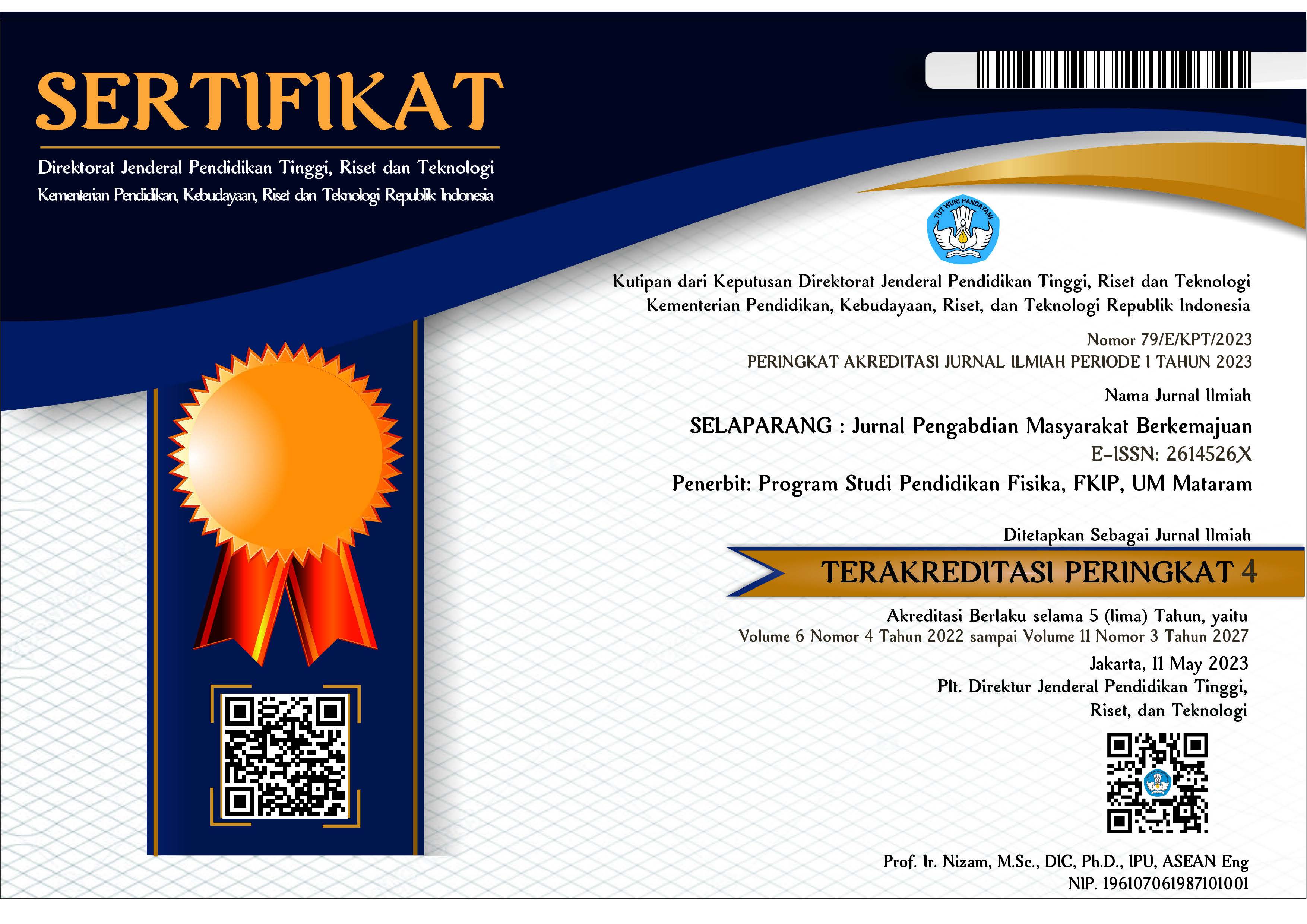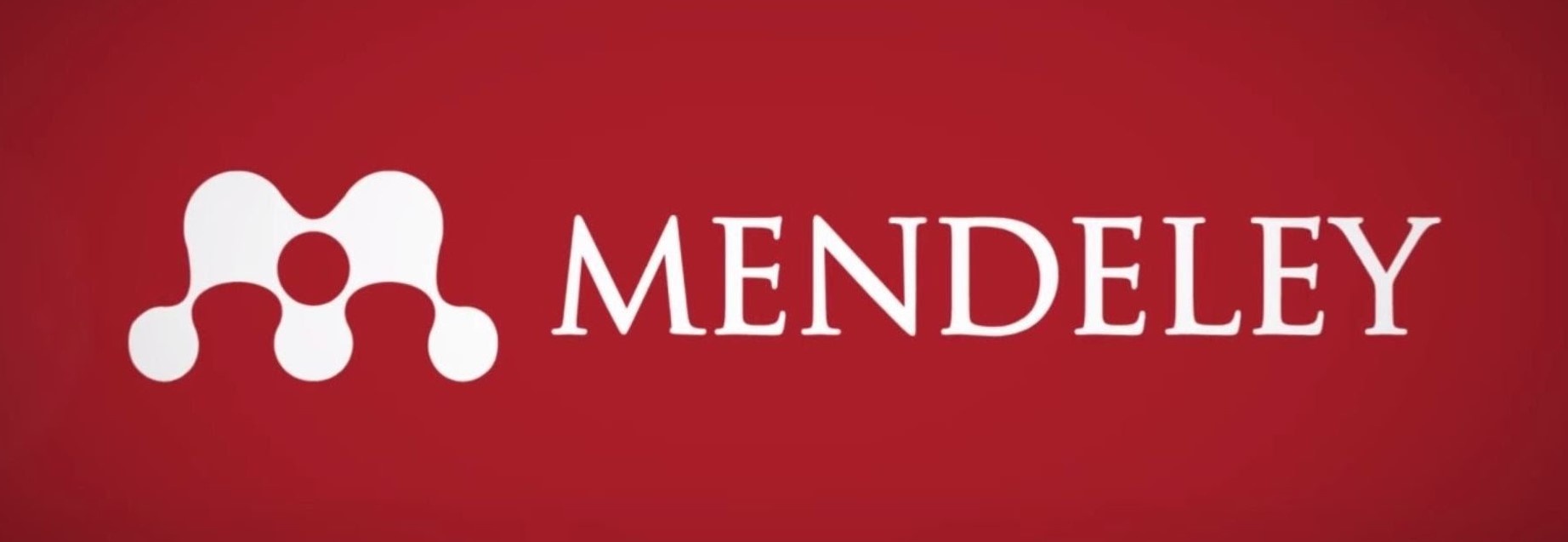Pelatihan penggunaan digital learning dalam pembelajaran biologi melalui Virtual Laboratory (VLAB) bagi guru biologi se-kabupaten Sukoharjo
Abstract
Abstrak
Penggunaan teknologi dalam pendidikan, termasuk penggunaan Virtual Laboratory (VLab), telah menjadi topik yang semakin penting dalam upaya meningkatkan efektivitas pembelajaran, sehingga perlu dilakukan pelatihan untuk menerapkannya. Pengabdian ini bertujuan untuk memberikan pelatihan guru menggunakan VLab pada pembelajaran biologi. Penelitian ini menggunakan model latihan partisipatif (Participatory Training Model) yang terdiri dari 5 tahapan, yaitu: 1) analisis kebutuhan; 2) membuat rencana pelatihan; 3) pelaksanaan pelatihan; 4) diskusi dan refleksi; 5) evaluasi dan rencana tindak lanjut. Partisipan dalam pelatihan ini adalah 33 guru biologi se-Kabupaten Sukoharjo yang telah menggunakan atau memiliki potensi untuk menggunakan VLab dalam pembelajaran mereka. Hasil analisis kebutuhan menunjukkan bahwa sebagian besar guru masih belum mengaplikasikan VLab dalam pembelajaran biologi. Guru juga mengalami hambatan dalam mengaplikasikan VLab dikarenakan faktor usia, kurangnya motivasi, kurangnya pelatihan, keterbatasan teknologi, ketersediaan konten yang terbatas, tantangan manajemen kelas, dukungan administrasi, koneksi internet, dan cara evaluasi penilaian dalam VLab. Hasil analisis kebutuhan ini dijadikan dasar untuk melakukan pelatihan terhadap guru MGMP biologi SMA di Kabupaten Sukoharjo selama 1 minggu untuk mengoptimalkan pemahaman dan keterampilan guru dalam mengaplikasikan VLab dalam pembelajaran biologi. Hasil dari pelatihan menunjukkan bahwa pelatihan memenuhi harapan guru untuk meningkatkan kemampuan pedagogiknya mengaplikasikan VLab. Implikasi dari penelitian ini adalah pentingnya pelatihan untuk mendukung pengaplikasian VLab dalam meningkatkan kualitas pembelajaran biologi di SMA.
Kata kunci: digital learning; laboratorium virtual; pembelajaran biologi
Abstract
Technology in education, including Virtual Laboratory (VLab), has become an increasingly important topic in efforts to increase learning effectiveness, so training is needed to implement it. This service aims to provide teacher training using VLab in biology learning. This research uses a participatory training model, which consists of 5 stages, namely: 1) needs analysis; 2) create a training plan; 3) implementation of training; 4) discussion and reflection; 5) evaluation and follow-up plan. Participants in this training were 33 biology teachers throughout Sukoharjo Regency who have used or had the potential to use VLab in their learning. The needs analysis results show that most teachers have not applied VLab in biology learning. Teachers also experience obstacles in applying VLab due to age, lack of motivation, lack of training, technological limitations, limited content availability, class management challenges, administrative support, internet connection, and how to evaluate assessments in VLab. The results of this needs analysis were used to conduct training for high school biology MGMP teachers in Sukoharjo Regency for 1 week to optimize teachers' understanding and skills in applying VLab in biology learning. The training results show that it meets teachers' expectations to improve their pedagogical abilities in applying VLab. The implication of this research is the importance of training to support the application of VLab in improving the quality of biology learning in high school.
Keywords: biology learning; digital learning; virtual laboratory
Keywords
Full Text:
PDFReferences
Achuthan, K., Kolil, V. K., & Jyothy, S. N. (2023). Effectiveness of Virtual Laboratory Teacher Training Workshops: A Kirkpatrick Model Analysis. International Journal of Emerging Technologies in Learning, 18(15). https://doi.org/10.3991/ijet.v18i15.40037
Ali, N., Ullah, S., & Khan, D. (2022). Interactive Laboratories for Science Education: A Subjective Study and Systematic Literature Review. Multimodal Technologies and Interaction, 6(10). https://doi.org/10.3390/mti6100085
Aljuhani, K., Sonbul, M., Althabiti, M., & Meccawy, M. (2018). Creating a Virtual Science Lab (VSL): the adoption of virtual labs in Saudi schools. Smart Learning Environments, 5(1). https://doi.org/10.1186/s40561-018-0067-9
Anfa, Q., Aryungga, S. D. E., & ... (2021). Pelatihan Di Masa Pandemi Covid-19 Tentang Pembuatan Lembar Petunjuk Praktikum Ipa Berbasis Laboratorium Virtual. … Dan Pengabdian 2021.
Aulia Najiyah, P. S., Dwisandi, R. F., Nizar Maulana, M., & Hernawati, D. (2021). Bio-VLab: Virtual Laboratory Based on Android Educational Game. Pancaran Pendidikan, 10(1). https://doi.org/10.25037/pancaran.v10i1.286
Ayega, D., & Khan, A. (2020). Students Experience on the Efficacy of Virtual Labs in Online Biology. ACM International Conference Proceeding Series. https://doi.org/10.1145/3439147.3439170
Azizah, N., & Alberida, H. (2021). Seperti Apa Permasalahan Pembelajaran Biologi pada Siswa SMA? Journal for Lesson and Learning Studies, 4(3). https://doi.org/10.23887/jlls.v4i3.38073
Benkova, M., Soukup, O., & Marek, J. (2020). Antimicrobial susceptibility testing: currently used methods and devices and the near future in clinical practice. Journal of Applied Microbiology, 129(4). https://doi.org/10.1111/jam.14704
Byukusenge, C., Nsanganwimana, F., & Tarmo, A. P. (2024). Investigating the effect of virtual laboratories on students’ academic performance and attitudes towards learning biology. Education and Information Technologies, 29(1). https://doi.org/10.1007/s10639-023-12351-x
Crompton, H., & Sykora, C. (2021). Developing instructional technology standards for educators: A design-based research study. Computers and Education Open, 2. https://doi.org/10.1016/j.caeo.2021.100044
Errington, T. M., Mathur, M., Soderberg, C. K., Denis, A., Perfito, N., Iorns, E., & Nosek, B. A. (2021). Investigating the replicability of preclinical cancer biology. ELife, 10. https://doi.org/10.7554/eLife.71601
Firda, A., Afidah, M., & Wahyuni, S. (2021). Sosialisasi Pemanfaatan Aplikasi Laboratorium Virtual Dalam Pembelajaran. DINAMISIA: Jurnal Pengabdian Kepada Masyarakat, 5(5). https://doi.org/https://doi.org/10.31849/dinamisia.v5i4.3495
Grobler, S. (2022). Quality Education in the Context of the Sustainable Development Goals : An Interpretation Model. 34(1), 153–164.
Hamed, G., & Aljanazrah, A. (2020). THE EFFECTIVENESS OF USING VIRTUAL EXPERIMENTS ON STUDENTS’ LEARNING IN THE GENERAL PHYSICS LAB. Journal of Information Technology Education: Research, 19. https://doi.org/10.28945/4668
Khairani, S. H. (2020). Analisis Pelaksanaan Praktikum Biologi dan Permasalahannya di SMAN 2 Lintau Buo. Institut Agama Islam Negeri Batu Sangkar, Agustus 2020.
Khukalenko, I. S., Kaplan-Rakowski, R., An, Y., & Iushina, V. D. (2022). Teachers’ perceptions of using virtual reality technology in classrooms: A large-scale survey. Education and Information Technologies, 27(8). https://doi.org/10.1007/s10639-022-11061-0
Kolil, V. K., & Achuthan, K. (2023). Longitudinal study of teacher acceptance of mobile virtual labs. Education and Information Technologies, 28(7). https://doi.org/10.1007/s10639-022-11499-2
Koyunlu Ünuü, Z., & Dökme, İ. (2020). The Effect of Technology-Supported Inquiry-Based Learning in Science Education: Action Research. Journal of Education in Science, Environment and Health, 6(2). https://doi.org/10.21891/jeseh.632375
Kurniawan, E., Eva, B., Dafip, M., & Sriyanto, S. (2020). A teaching based technology in geography learning. Cypriot Journal of Educational Sciences, 15(4). https://doi.org/10.18844/cjes.v15i4.5058
Kwangmuang, P., Jarutkamolpong, S., Sangboonraung, W., & Daungtod, S. (2021). The development of learning innovation to enhance higher order thinking skills for students in Thailand junior high schools. Heliyon, 7(6). https://doi.org/10.1016/j.heliyon.2021.e07309
Masruri, M. (2020). IDENTIFIKASI HAMBATAN PELAKSANAAN PRAKTIKUM BIOLOGI DAN ALTERNATIF SOLUSINYA DI SMA NEGERI 1 MOGA. Perspektif Pendidikan Dan Keguruan, 11(2). https://doi.org/10.25299/perspektif.2020.vol11(2).5259
Mikropoulos, T. A., & Natsis, A. (2011). Educational virtual environments: A ten-year review of empirical research (1999-2009). Computers and Education, 56(3). https://doi.org/10.1016/j.compedu.2010.10.020
Muhamad, M., Zaman, H. B., & Ahmad, A. (2012). Virtual Biology Laboratory (VLab-Bio): Scenario-Based Learning Approach. Procedia - Social and Behavioral Sciences, 69. https://doi.org/10.1016/j.sbspro.2012.11.395
Myburgh, P. H. (2022). Reflecting on the Creation of Virtual Laboratory Experiences for Biology Students. Frontiers in Education, 7. https://doi.org/10.3389/feduc.2022.796840
Penn, M., & Mavuru, L. (2020). Assessing pre-service teachers’ reception and attitudes towards virtual laboratory experiments in life sciences. Journal of Baltic Science Education, 19(6). https://doi.org/10.33225/JBSE/20.19.1092
Poo, M. C. P., Lau, Y. Y., & Chen, Q. (2023). Are Virtual Laboratories and Remote Laboratories Enhancing the Quality of Sustainability Education? In Education Sciences (Vol. 13, Issue 11). https://doi.org/10.3390/educsci13111110
Prayogi, S. (2023). Pemanfaatan Virtual Laboratory dalam Pehamaman Fisika Siswa SMA IT Al Uswah Surabaya. Jurnal.Matradipti.Org, 1.
Radivojević, T., Costello, Z., Workman, K., & Garcia Martin, H. (2020). A machine learning Automated Recommendation Tool for synthetic biology. Nature Communications, 11(1). https://doi.org/10.1038/s41467-020-18008-4
Reeves, S. M., & Crippen, K. J. (2021). Virtual Laboratories in Undergraduate Science and Engineering Courses: a Systematic Review, 2009–2019. Journal of Science Education and Technology, 30(1). https://doi.org/10.1007/s10956-020-09866-0
Riyanto, Amin, M., Suwono, H., & Lestari, U. (2020). The new face of digital books in genetic learning: A preliminary development study for students’ critical thinking. International Journal of Emerging Technologies in Learning, 15(10). https://doi.org/10.3991/ijet.v15i10.14321
Romano, M., Frolli, A., Aloisio, A., Russello, C., Rega, A., Cerciello, F., & Bisogni, F. (2023). Exploring the Potential of Immersive Virtual Reality in Italian Schools: A Practical Workshop with High School Teachers. Multimodal Technologies and Interaction, 7(12). https://doi.org/10.3390/mti7120111
Sari, N. P., Yusuf, M., & Yamtinah, S. (2020). Opportunities to Use Virtual Laboratories to Facilitate Biology Learning in High Schools. Jurnal Ilmu Pendidikan, 7(2), 809–820.
Soraya, G. V., Astari, D. E., Natzir, R., Yustisia, I., Kadir, S., Hardjo, M., Nurhadi, A. A., Ulhaq, Z. S., Rasyid, H., & Budu, B. (2022). Benefits and challenges in the implementation of virtual laboratory simulations (vLABs) for medical biochemistry in Indonesia. Biochemistry and Molecular Biology Education, 50(2). https://doi.org/10.1002/bmb.21613
Syam, Y. R., & Kurniasih, S. (2023). Kebutuhan Terhadap Laboratorium Virtual Berbasis Masalah pada Materi Sistem Peredaran Darah. Jurnal Imiah Pendidikan Dan Pembelajaran, 7(1). https://doi.org/10.23887/jipp.v7i1.57970
Tomkins, M. (2023). Towards modelling emergence in plant systems. Quantitative Plant Biology, 4. https://doi.org/10.1017/qpb.2023.6
Wang, L., Kwiatek, G., Rybacki, E., Bonnelye, A., Bohnhoff, M., & Dresen, G. (2020). Laboratory Study on Fluid-Induced Fault Slip Behavior: The Role of Fluid Pressurization Rate. Geophysical Research Letters, 47(6). https://doi.org/10.1029/2019GL086627
Wibowo, Y. G., & Sadikin, A. (2019). Biology in the 21st-Century: Transformation in biology science and education in supporting the sustainable development goals. JPBI (Jurnal Pendidikan Biologi Indonesia), 5(2). https://doi.org/10.22219/jpbi.v5i2.7956
Yazdani, A., Lu, L., Raissi, M., & Karniadakis, G. E. (2020). Systems biology informed deep learning for inferring parameters and hidden dynamics. PLoS Computational Biology, 16(11). https://doi.org/10.1371/journal.pcbi.1007575
Yli-Panula, E., Jeronen, E., Lemmetty, P., & Pauna, A. (2018). Teaching methods in biology promoting biodiversity education. Sustainability (Switzerland), 10(10). https://doi.org/10.3390/su10103812
Zaturrahmi, Z., Festiyed, F., & Ellizar, E. (2020). The Utilization of Virtual Laboratory in Learning: A Meta-Analysis. Indonesian Journal of Science and Mathematics Education, 3(2). https://doi.org/10.24042/ijsme.v3i2.6474
DOI: https://doi.org/10.31764/jpmb.v8i3.25447
Refbacks
- There are currently no refbacks.

This work is licensed under a Creative Commons Attribution-ShareAlike 4.0 International License.
______________________________________________________
Jurnal Selaparang
p-ISSN 2614-5251 || e-ISSN 2614-526X
EDITORIAL OFFICE:



















